Essay on National FestivalsThe festivals of India are described as vibrant, lively, and happy moments. In India, several festivals are joyously celebrated. Since there are many religions in India, many religious festivals are celebrated, and holidays are given for major festivals in offices and schools. On top of these holidays, there are a few National festivals that the entire country of India enthusiastically celebrates, regardless of religion or caste. Because India is such a diverse cultural country, it is home to various religious beliefs, ethnicities, and traditions. People observe many distinct festivals in how they are kept in their cultures. These festivals have also played an important part in Indian history. National festivals contribute to a sense of patriotism and remind us that, despite our differences, our love for our nation binds us all. We celebrate these holidays with tremendous pomp and display to honour historical landmarks in India. 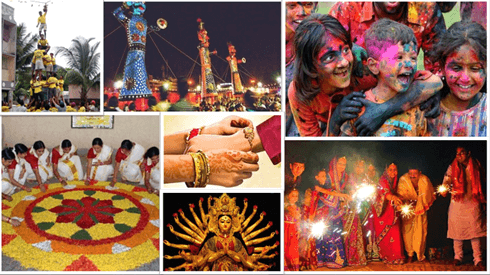
National Festivals of IndiaRepublic DayIt is an Indian national holiday commemorating the date on which the Constitution of India came into effect, replacing the Government of India Act 1935 as the country's governing legislation and transforming it into a republic. It also represents India's structural transformation from an independent Commonwealth country to a sovereign and independent republic in the Commonwealth of Nations, with the President of India acting as the Indian Union's nominal head. 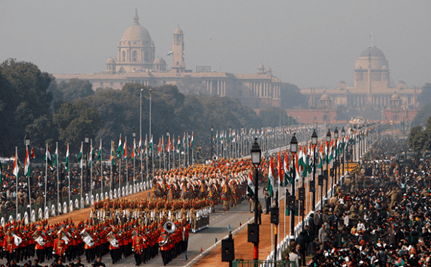
The Indian Constituent Assembly passed the Constitution on November 26, 1949. It went into effect on January 26, 1950, with a system of democratic governance which finally accomplished the country's transformation into a fully independent nation. The 26th of January was selected as Republic Day given that it was on this day in 1930 that the Indian National Congress announced the Declaration of Independence, rather than the subsequently re-established Realm status as a Dominion by the leaving British System of governance. British India was partitioned into two new independent Dominions by the Indian Independence Act of 1947, an Act that was passed in the United Kingdom Parliament. With the British losing their grip on India via numerous controversial measures and executing many heinous crimes, the most awaited day arrived. On January 24, 1950, the 308 members of the Assembly signed two handwritten copies of the accord after a thorough review and minor revisions. It became effective two days later, on January 26, 1950. Dr Rajendra Prasad began his first term as President of India that day. The Constituent Assembly was also renamed the Parliament of India under the new provisions. The prime Republic Day celebrations occur on New Delhi's Rajpath in the presence of India's President. Ceremonial parades are held on the Rajpath on this day to honour India and its togetherness in diverse cultures and its cultural legacy. Independence DayEvery year on August 15, India observes a national holiday to commemorate the country's independence from the United Kingdom on August 15, 1947, when the provisions of the Indian Independence Act gave legislative autonomy to the Indian Constituent Assembly and entered into effect. India retained King George VI as its head of state until the Constitution of India was enacted on January 26, 1950, with the adoption of the sovereign law Constitution of India replacing the dominion prefix, Dominion of India. India gained freedom through a movement centred on a nonviolent protest that can be witnessed in the campaigns like Satyagraha, The Dandi march and many others. 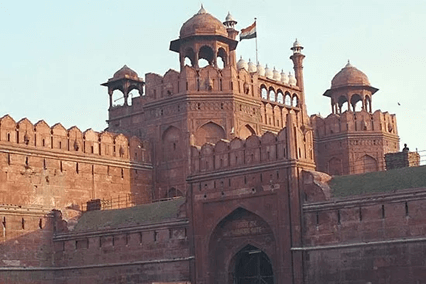
The President of India gives the "Address to the Nation" on the eve of Independence Day. On August 15, the Prime Minister hoists the Indian flag and addresses the country from the iconic Lal Qila in Delhi. In his address, the Prime Minister summarises the previous year's successes, emphasizes crucial problems, and urges ongoing progress. The Prime Minister also honours the martyrs of the independence movement at the ceremony. The national anthem, the cherished "Jana Gana Mana", is sung with equal passion. The Indian Armed Forces and paramilitary forces perform a march past after the address. Parades and pageants portray moments from India's liberation struggle and its many cultural traditions. Jawaharlal Nehru, India's first Prime Minister, hoisted the national flag over the Lahori Gate of the Lal Qila in Delhi on August 15, 1947. Until 1973, the State Governor raised the National Flag at the State Capitol. In February 1974, Tamil Nadu Chief Minister M. Karunanidhi discussed the issue with then-Prime Minister Indira Gandhi, urging that Chief Ministers, like the Prime Minister, be permitted to hoist the national flag on Independence Day in respective states. Since 1974, Chief Ministers of independent states have been privileged to hoist the national flag on Independence Day. Flag hoisting ceremonies and cultural activities are held all around the country in governmental and non-governmental organizations. Schools and universities also host flag-hoisting ceremonies and cultural activities. Government and non-governmental organizations adorn their offices with paper, balloon decorations, and wall hangings with portraits of freedom fighters. Significant government structures are usually ornamented with light strings. Another traditional method to commemorate this day is to fly a kite. Gandhi JayantiIt is an annual festival held in India on 2 October every year to commemorate the birthday of Mahatma Gandhi. Because he was a nonviolent freedom fighter, the United Nations General Assembly designated October 2nd as the International Day of Nonviolence on June 15th, 2007. In India, he is also addressed as the "Father of the Nation," a title bestowed upon him by the beloved Netaji Subhash Chandra Bose in recognition of his unrelenting battle for freedom. 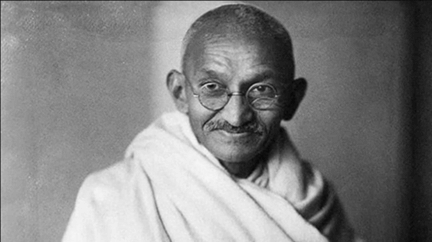
Gandhi Jayanti is observed with prayer services and tributes throughout India, most notably at Gandhi's memorial, Raj Ghat, in New Delhi, where he was finally laid to rest. Prayer meetings and commemorative rituals sponsored by colleges, local governments, and socio-political groups are among popular events in many places. Drawing and short story competitions are organized, with the best prizes given to schools that recognize Gandhi's commitment to freedom and encourage people to live a harmonious life. Raghupati Raghav Raja Ram, Gandhi's favourite Bhajan, is widely sung in his honour. Across the country, flowers and garlands adorn the sculptures of Mahatma Gandhi. On this day, some people refrain from consuming alcohol or eating animal products. Government offices like banks, post offices and so on are all closed on this day. On the mark of his 150th birthday, Mahatma Gandhi was named for various honours. The Central Railway zone marked Mahatma Gandhi's 150th birthday by painting diesel locomotives with a picture of Gandhi on a background of the national tricolour. Indian Prime Minister Narendra Modi produced a ?150 coin in Gandhi's honour. Congress employees took a collective oath to carry on Mahatma Gandhi's vision. Meanwhile, Amit Shah, President of the BJP, declared the start of the party's countrywide Gandhi Sankalp Yatra. PM Modi addressed about 10000 sarpanches at Gujarat's Sabarmati Ashram in the evening. He also declared India free of open defecation, praised the achievement of the Swachh Bharat Mission, and pledged a battle against plastic use. The M.F. Hussain Art Gallery at Jamia Millia Islamia organized an exhibition named 'Picture Postcards for Gandhi' to commemorate Mahatma Gandhi's 150th birth anniversary and his dedication to the nation. The show was conceptualized, created, and curated by Prof. Farhat Basir Khan. What are India's major national-religious festivals?India is a vast country with various communities, traditions, and other aspects. So, there is diversity in festive holidays observed in India, and these festivals are numerous. Therefore, we will only discuss some of the important national/religious festivals of India. These are as follows: Holi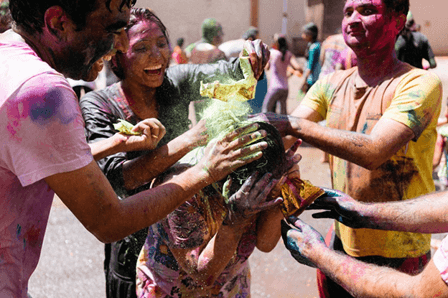
It is also known as the 'festival of colours'. According to mythology, when Hiranyanaksap once desired to murder his son, he contacted his sister, Holika. She wore a magical robe, and this robe could keep the wearer from being consumed by fire. Hiranyakashyap ordered his sister and Prahlad to sit on a flaming fire. He believed that the magic robe's fire would not damage his sister and that Prahlad would be burned to death. The conclusion, however, was the polar opposite of what the demon king had planned. As a result, Prahlad managed to escape the roaring fire unharmed, but Holika died from burns. The festival is held over for two days. The festival of Holi begins with Holika Dahan on the evening of the first day and ends on the second day on Rang Panchami. People are seen sporting a range of colours during Holi. They paint each other, sing, and dance together. They worship Lord Krishna and decorate his idol. Families gather and celebrate the whole day by eating sweets, snacks, and delicious food. Ganesh Chaturthi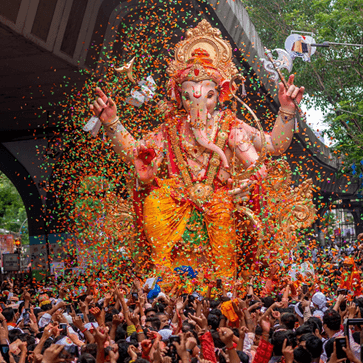
Vinayaka Chaturthi is another name for this occasion. It is an important festival celebrated throughout India to commemorate Lord Ganesha's holy journey to the earthly realm in the month of Bhadra, which falls in August/September. This renowned festival, also known as 'Ganesh Jayanti', concludes with Lord Ganesha's statue immersed in rivers and lakes in a celebratory mood. 'Ganesh Utsav' gathers people together in undivided devotion for ten days of rites, feasts, and singing of potent mantras that eulogize various attributes of Lord Ganesha. This festival emphasizes the heavenly component of knowledge and intelligence, with the omnipresent idols of Lord Ganesha in his splendid seated posture bestowing victory on people in critical endeavours. Navratri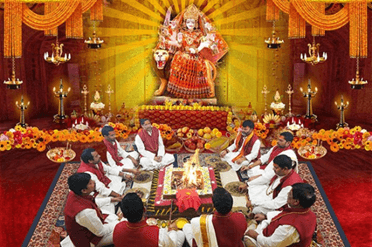
This is one of the most important Hindu festivals celebrated throughout India. The name Navratri comes from a Sanskrit term that means "nine nights". As the name implies, the festival lasts nine days and nine nights. People in several parts of India also dance during this event. People fast, help feed the needy people, and worship nine different goddesses for nine days. Durga Puja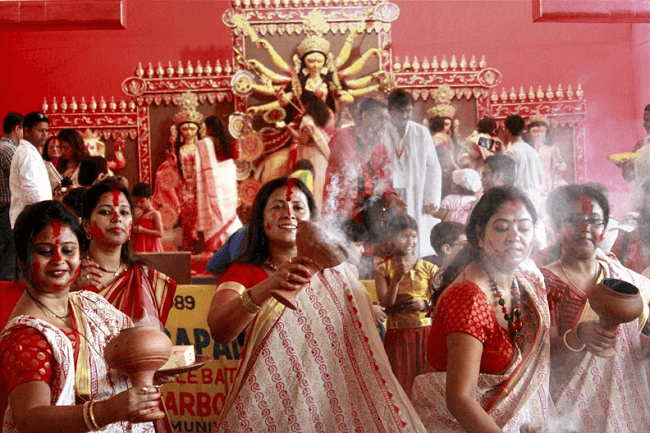
It is one of India's most important religious festivals. It is an annual festival held throughout the country to worship and recall the Goddess Durga's victory over Mahishasur (asura). The festival takes place during the month of Ashwin in the Indian calendar, which corresponds to September-October in the Gregorian calendar. Durga Puja lasts ten days, the last five of which are the most significant. The puja is conducted both privately and publicly, using a temporary stage and structural decorations called pandals. Scripture recitations, performing arts, partying, gift-giving, family visits, eating, and public processions are all part of the festivities. Everyone is dressed in new outfits for this event. Dussehra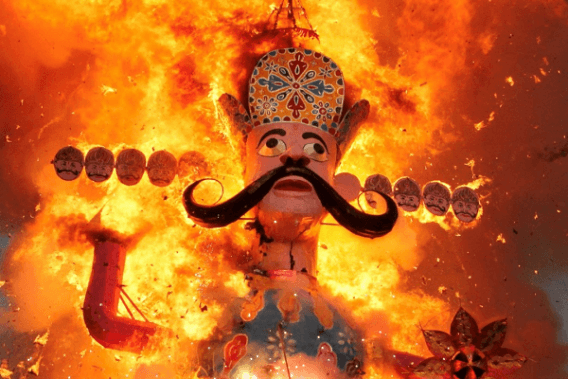
This festival is held after Navratri or even after Durga Puja. Vijayadashami is another name for Dussehra. This occasion is celebrated in a variety of ways across the nation. Dussehra is celebrated in style in Mysore by adorning the Mysore Palace with spectacular lights. Vijaya Dashami is a sacred day for the Indians since it is a day when they worship, protect, and adore Shakti. According to the Scriptures, by worshipping Shakti on these nine days, householders get triple power, namely physical, mental, and spiritual, which allows them to succeed in life with ease. Diwali (Deepavali)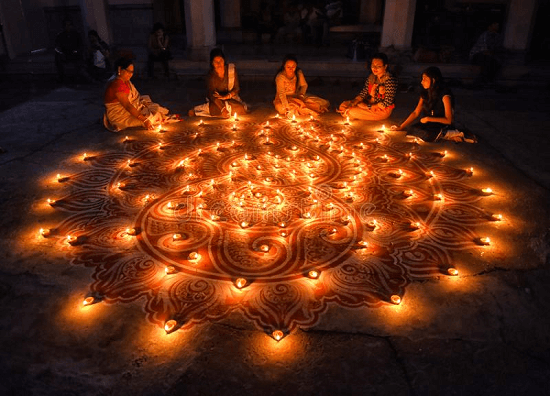
Diwali, or the Festival of Lights, is the most anticipated and cherished festival in India. People throughout the country greet the celebration with joyful gestures. This magnificent festival is a five-day long festival. However, the prominent rituals of the Diwali celebration mainly take place on the third day of the festive event. The main rituals of the occasion include illuminating Diyas and candles throughout the household and bursting crackers to honour Goddess Laxmi and God Ganesha in order to bring health and wealth. Furthermore, exchanging emotional presents has emerged as an essential aspect of the Diwali festival. Friends, family and colleagues exchange Diwali gifts to express their warmth and devotion. A unique and large feast with exquisite cuisine that must contain various types of desserts is also a distinctive attraction of the event. Eid-ul-Fitr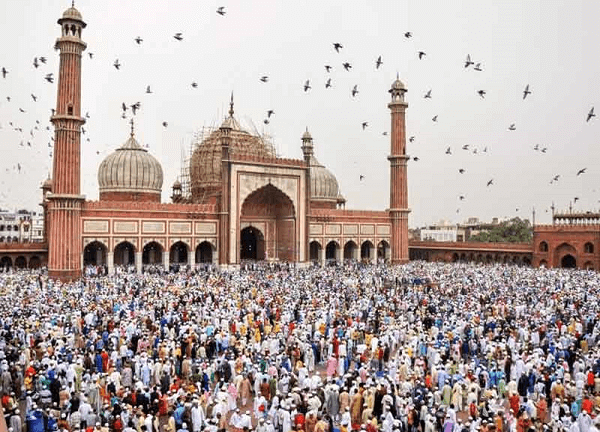
This is one of India's most important celebrations for the Muslim population. It commemorates the completion of Ramadan (the holiest month for Muslims). It is marked on the first day of the month of Shaban (Islamic Month). On this auspicious occasion, everyone wears new clothes, prays Eid Namaz at mosques, and visits relatives' homes. Christmas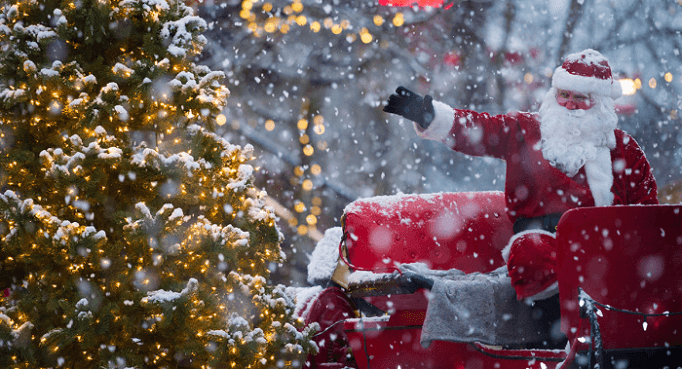
It is the most well-known festival in the world, marking Jesus Christ's birth. It is also widely celebrated on a massive scale in India. It is observed every year on 25th December and is followed by the New Year. People gather and celebrate this day with gifts, sweets and prayers. Children eagerly wait for this festival as they believe that on this day, Santa comes and fulfil their wishes. ConclusionThe national holidays of India are important days to commemorate our great leaders and to derive inspiration from their unrivalled deeds. These festivals enable us to preserve our country's heritage close to our hearts even after all these years. They encourage citizens to set aside their disagreements and collaborate together. The events planned to commemorate these days make us proud of our country and help us bond with our neighbours, colleagues, and other close friends and family members through patriotism.
Next TopicValue of Games and Sports Essay
|
 For Videos Join Our Youtube Channel: Join Now
For Videos Join Our Youtube Channel: Join Now
Feedback
- Send your Feedback to [email protected]
Help Others, Please Share









